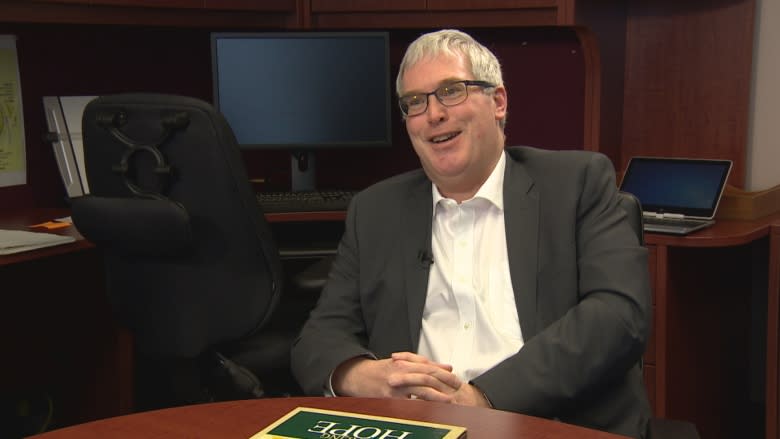Former KPMG consultant will oversee Health Sciences Centre's transition to new health organization
Ronan Segrave's commute these days is indoors.
The interim chief operating officer at Winnipeg's Health Sciences Centre is staying at the hotel attached to the massive hospital complex until he settles into an apartment in January.
The walk gives him time to see who is using HSC and to ponder its role, as the facility is soon to be severed from the Winnipeg Regional Health Authority and stitched into a new entity — Manitoba Shared Health Services.
It was announced in June the new organization will take on and centralize some of the functions currently overseen by the province's five regional health authorities, including ambulance services and diagnostic imaging.
It will also take over the operation of HSC.
Segrave has been hired to oversee the hospital's transition to Shared Health Services, manage those changes, find efficiencies, lower wait times and deal with increased volumes of patients as services at other facilities in Winnipeg shut down or transition.
Over all of that looms a big question — what about job cuts?
Day 3 of his new job was a very big day indeed. On Wednesday, word was filtering through HSC that the outline of the management chart for the new Shared Health Services department is out, and the new interim COO knew there was chatter.
He sent out an email and video message to staff Wednesday about his first days on the job.
Segrave starts his tenure with the advantage of some deep knowledge about Manitoba's health system. He was part of the KPMG consultancy team that spent months probing Manitoba's health system.
Part of its report has been made public. The Progressive Conservative government has vowed to make the rest of KPMG's findings public in the spring.
Segrave knows coming from the consultant's role into heading up the HSC makes some nervous.
"I can understand why people might have those views and those perceptions. I'm certainly aware of it," he said.
"What I can say is my work in those areas and with those companies, some people might think I was working with accountants. That's not how these companies are actually established and run. They're staffed by people who have many years of experience working in health care."
Born in Ireland, Segrave worked in the UK's health service before moving into consultant work, mainly with Ernst and Young UK. He later made the journey to Canada, settling in British Columbia and continuing to advise on major health-system changes.
His work has been so behind the scenes a data search by CBC News's research department found only one single article anywhere mentioning him. It was in the Winnipeg Free Press just this week.
Segrave laughed at his anonymity, but is somewhat guarded about the role he played in changes to health care in Great Britain, saying he is bound by the UK's Official Secrets Act and has to keep mum on some of his contributions.
But he promises to be as open as possible during his stint in Manitoba, pledging he will be "very straightforward with people and acknowledge we are going through a time of change and transformation."
Guarded answers on workforce cuts
One thing Segrave will have to be straightforward about is workforce reductions. KPMG was clear in the parts of the report that are currently accessible that changes should be made in Manitoba's health-care workforce.
There is duplication of services and administration in health, according to KPMG's report, and though the current government won't say it, KPMG suggests regional health authorities could someday be merged.
Segrave was asked three times by CBC News if cuts are coming but was guarded in his answers. He says the goal is not reductions but the right model, well delivered.
"The staffing model needs to align with that. It's not for me to say what that means around specific individuals or around how that configuration takes place. It is coming from the specific lens of leading practice, and ensuring processes and functions that should be consolidated [are] consolidated."
He also knows announced changes to services such as physiotherapy, occupational therapy or IV units can trigger a public backlash. Part of his job will be to explain how patient care can improve and be delivered more efficiently when it looks like services are being cut.
If job losses or changes to service are a touchy subject, the reasons HSC is being removed from the regional health authority fold are not.
"HSC's role has always been [to be] Manitoba's hospital — a major provincial and tertiary centre. I think in the context of Shared Health — because that is primarily its role — from my perspective it is appropriate it forms under the governance of a provincial organization," he says.
Leading HSC through 'very important transition'
While running Manitoba's largest hospital rests partially on Segrave's shoulders, it is the move out from under the umbrella of the WRHA that is his mission.
"That is my mandate. My mandate is to — working with my senior team here — to lead and guide this organization through this very important transition," Segrave says.
He said that can be done despite the end of emergency care at some hospitals or the closure of Quick Care clinics, using better pathways to care and focus on patients.
"Patients are not terribly concerned whether this is [under] Shared Health, from their perspective. My focus, as part of this transition, is that care remains seamless."
Manitoba's biggest hospital gets busier
In the meantime, the volume of patients through the doors of HSC's emergency department is rising and Segrave is quick to point out that so far, wait times are are going down.
But the health-policy veteran, who says he wanted to take more of an operational role in health, will be a key figure in generational changes to come. Segrave will now be implementing the policies he suggested.
Now he has to convince more than 10,000 staff to follow along, manage the change and keep their morale up.
"I'm talking to staff around the need to embrace change. That actual change will also bring tremendous opportunities, in terms of HSC [and] its role — its clinical role. I am absolutely acknowledging that change brings with it anxiety and concerns. And [I am] committing with staff to address those as best I can," Segrave said.
He said while you never know what the future will hold, he is comfortable with the title of "interim" chief operating officer — for now.




